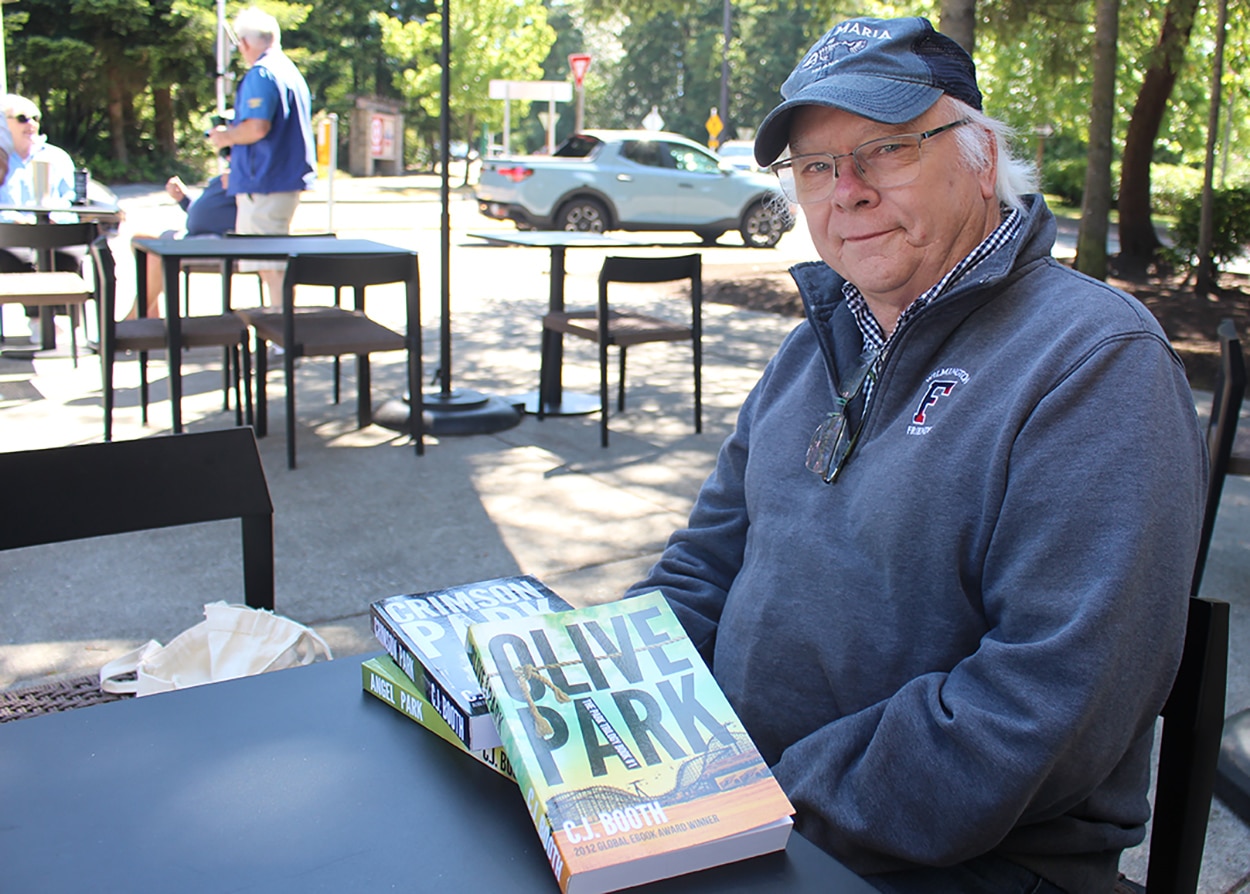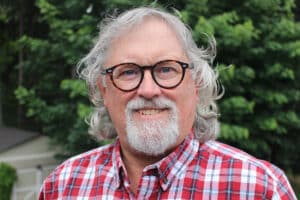Arts & Entertainment Community Community Editorials
In the Margins: Local author’s work picked for lunar library
We all have dreams and goals. And so often we hear the time-honored advice to just go for it. Shoot for the moon!
Community Sponsor
Community stories are made possible in part by Peninsula Light Co, a proud sponsor of Gig Harbor Now.
Someday soon, C.J. Booth’s literary dream will land on the moon … literally.
Introducing the Lunar Codex Project.
NASA plans to put humans back on the moon sometime in 2026. Along with scientific instruments and other goodies, selected pieces of art, literature, music and film will go along for the ride. These pieces, along with the artists’ backstories and bios, will be stored digitally on the moon. The project is the dream of renowned author Samuel Peralta.
Introducing C.J. Booth. He’s a Gig Harbor resident and author who had both feet firmly on Earth when his first novel, the mystery-thriller Olive Park, rocketed in sales and popularity. To say the least, he was ecstatic when he learned his novel had been selected to make the voyage. On a whim, he applied for the Lunar Codex Project. Over a year passed before he learned his book was one of 125 to be selected.

Gig Harbor resident C.J. Booth with a copy of Olive Park, his award-wining first novel.
A time (and space) capsule
Think of the Lunar Codex Project like a time capsule. In the 1980s, it was cool to scoop up a bunch of personal belongings and artifacts of the day, put them in a tube and sink it in the ground with an above-ground message asking for someone to dig it up in 50 years and be dazzled. But this is different. All literary and artistic works have been digitized and stored on a chip the size of a quarter.
A mystery novel stored digitally on the moon inspires the natural question: Who on Earth/the moon is going to read THAT!?
“Somebody asked me that,” said Booth. “Well, I’m sure if an alien can make it to the moon I’m sure they’ll have access.”
Lesson One from Star Trek: Never embark into a distant galaxy without a tech nerd.
Speaking of nerds. If you were an early Saturday Night Live devotee, you’ll recall the 1977 comedy sketch about NASA’s Voyager which took a payload of art, music and Earth-stuff to outer space. The collection included a Golden Record recording of Chuck Berry’s “Johnny B. Goode,” inspiring the first-ever interstellar response. Steve Martin handled the punch line: “Send more Chuck Berry.”
I guess you had to be there.
Radio days
A native of Wilmington, Delaware, Booth married deep into the Peninsula area’s root zone. His wife, Elizabeth, is the daughter of former Peninsula High School drama/music/teaching/radio legend Milt Boyd, for whom Peninsula’s auditorium is named. Booth has three children: daughters Shannon and Sarah, and son David.
Booth, 74, spent his early career years working in radio, film, video and sound engineering. His own career in media began, as he says, when he drove from his high school graduation to his first gig in radio.
It was a small-market AM station in Rio Grande, New Jersey. He worked six-hour shifts, six days a week, making extra scratch repairing TV sets out of his home.
Like so many veterans of radio, Booth’s file cabinet of interesting tales isn’t confined to mysteries. Small/mid-market radio can be the source of great stories:
- There was the time a station owner offered him a side bonus of $50 for a little spot duty: Scaling to the top of the station’s transmission tower to change out the lightbulb. He declined.
- How about the time the newscaster at an FM station in Minnesota pre-corded three top-of-the-hour newscasts — then used those three hours to slink away for Canada and avoid the Vietnam military draft. The dude’s draft lottery number had been drawn number one and Uncle Sam was watching, man!
- Or at one time working for a tiny-market daylight-to-dusk station with an “all polka format.” Presumably “The Happy Wanderers” (trust me … check it out on Youtube, kids. Eugene Levy and John Candy were at their best) were in heavy rotation.
- Yes. Like any veteran of the airwaves, Booth admits to falling asleep on the air. It was a Sunday afternoon shift. Enough said.
That’s a big tale
From that humble start in radio in Rio Grande, New Jersey, Booth spent decades zooming through the entertainment portals of the human condition, working in video production, sound engineering, freelancing and owning his own businesses. Freelance sound engineering fostered experiences such as visiting Monte Carlo and working on a recording project deep in the Sahara.
Making medical-industry videos was most lucrative, but “you can only make so many trips to Cleveland.”
But let’s get real. Who doesn’t have literary dreams of popping out that lucrative page-turner … first time out of the box? Everybody has THAT ONE amazing story, right?
“I wrote this,” said Booth, tapping the cover of Olive Park. “And it won three awards and I said, geez, this publishing stuff is easy. I can do this all day. This worked well. I’ll turn it into a trilogy.”
And how did that work?
“Worst mistake of my life. Because I knew how Olive Park was going to end. I didn’t know how the next two books would end. I had to go back into this book (Olive Park) to figure out how I was going to end the next two books.”
Inspired by Dickens and Connelly
Working as a self-published author, Booth has now turned out eight mystery novels along with several short stories. He followed up 2011’s breakout Olive Park with two more novels to complete the trilogy, Crimson Park (2016) and Angel Park (2018). Booth has since published five books in his more-recent “Diamond and Stone” series. A sixth is on the way.

CJ Booth holds a certificate recognizing that his works will travel to the moon as part of the Lunar Codex Project.
From a story-telling perspective, Booth tips his cap to his writing hero, crime novelist Michael Connelly. Booth’s story-telling formula is simple. For a mystery, he writes the beginning, then the end. The middle is like putting together a giant jigsaw puzzle.
Writing format? His favorite author of all time would be Charles Dickens.
“The ability to come up with brevity, clarity and punch is key,” Booth says, with a nod to great novelist of the Victorian era. “I think formatting is one of the most overlooked things in publishing. Because it’s so important.”
A matter of style
“Nothing more was said on the ride to the library.”
That’s a single-sentence paragraph lifted from Olive Park. His writing style is punchy, brief and clear. Dickens would be proud.
Besides having the discipline to sit down at a keyboard and start writing, Booth offers a couple more suggestions to a successful writing career:
Don’t throw away anything
You’ll need it someday.
“My wife will tell you, I have boxes of unfinished manuscripts and notes and things like that,” Booth said. “I’ve gone back and looked at some of those things and not only do I not remember writing this, but some of this is really good and I need to reuse it.”
Let your subconscious do the work
Booth says he often makes notes around sleep. There’s highly-creative pipeline from Slumberland to the keyboard. Use it. After all, Keith Richards wrote Satisfaction in his sleep. You can look it up.
Look at ratings, not reviews
Before he publishes, he has up to five beta-readers who offer him input.
Use ellipses … great story-telling effect
Take care of business
Booth is self published. If something needs to be written, he writes it. If something needs to be promoted and advertised, he’ll handle it.
Take inspiration from where it comes
For Booth, a jolt of inspiration came once at Seattle’s Experience Music Project.
“One of the things that excites me most in life is seeing how things are created,” said Booth. “And one the things I loved in that museum is seeing a letterhead for one of the Seattle hotels. Jimi Hendrix had scrawled out the words to one of his songs. This is how he got the original idea. There’s cross-outs and there’s stuff in the margins. It’s felt like I was looking over his shoulder while he was writing. I love that. To me, that’s where genius comes from. I don’t really know where it comes from. But to see it written down is so cool.”
Someday … someone will land on the moon and discover C.J. Booth … and be inspired.

Leland Smith
A 39-year resident of Gig Harbor, Leland Smith enjoyed a 15 year career in media, including a 10-year shift as sports editor/photographer for The Peninsula Gateway. That was followed by a 25 year stint as a teacher, baseball coach and radio station manager for KGHP-FM and Peninsula High School. Smith will occasionally pinch-hit for Chris Phillips as author of the monthly In the Margins column.

